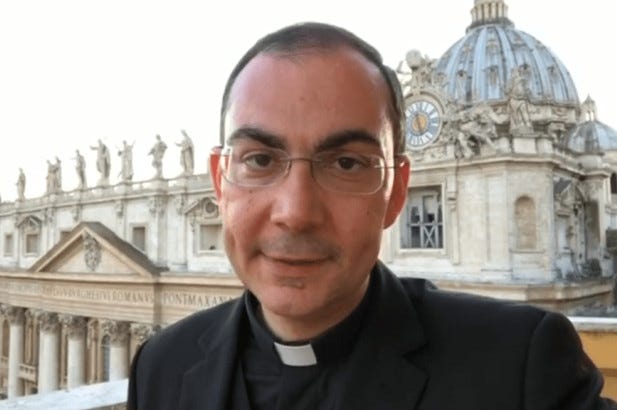
Pope Francis waives state secrecy for Becciu, Vatican official confirms spying claims
News: Vatican finances trial
Pope Francis has lifted the application of the pontifical secret in the Vatican financial trial, clearing the way for Cardinal Angelo Becciu to speak in court about his involvement with Cecilia Marogna, the self-described security consultant who says she spied for the cardinal on other curial officials.
The announcement was made in a Vatican City courtroom Wednesday, the second day of the trial’s evidentiary hearings, during which Msgr. Mauro Carlino, a former senior official at the Secretariat of State confirmed the department had investigated the director of a Vatican bank after it denied the secretariat a 150 million euro loan.
Chief judge Giuseppe Pignatone informed the court of the pope’s decision regarding the pontifical secret on Wednesday after judges asked for clarification on the confidentiality law, after Becciu refused in early March to address questions about Marogna, citing state secrecy.
Becciu and Marogna are facing charges of embezzlement and abuse of office in relation to her work for the Secretariat of State, for which she received hundreds of thousands of euros — allegedly spent on luxury hotels and designer label goods.
But she has also boasted about working as a kind of personal spy for Becciu, gathering dossiers of information on the private moral failings of other senior Church officials.
Like Becciu, Marogna has also cited state secrecy in court, while refusing to answer questions about her work for the Vatican.
The bulk of Wednesday’s hearing was spent with judges questioning Msgr. Mauro Carlino, a former official at the Secretariat of State’s administrative office.
Carlino is also a defendant in the trial, facing charges of abuse of office and extortion.
The priest was involved in the controversial London property deal at the center of the Vatican trial, in which the Secretariat of State paid a total of 350 million euros for a London development sold Raffaele Mincione, a former Vatican investment manager who is also on trial.
After the Vatican Secretariat of State bought the building in 2018, Carlino was one of a handful of secretariat officials listed as directors of a London-registered holding company through which the Secretariat controlled the building.
Carlino was removed as a company director in August 2019, shortly after the Vatican investigation into the deal was launched.
Carlino confirmed to the court that Archbishop Edgar Peña Parra, who succeeded Becciu as sostituto at the Secretariat of State in 2018, had authorized an investigation into the bank’s director general, Gianfranco Mammì, after Mammi denied the loan request.
Much of the investigation and trial has focused on the role of Gianluigi Torzi, a businessman with multiple ties to Mincione, who was contracted by the Secretariat of State to broker the acquisition of the London building and subsequently accused of extorting the Vatican for millions over control of the building.
Torzi has said the structuring of the deal was approved in detail by several senior secretariat officials, including Cardinal Parolin and Archbishop Peña Parra.
A key witness for the prosecution is Msgr. Alberto Perlasca, who headed the secretariat’s administrative office under Becciu and then Peña Parra, before being moved to the Apostolic Signatura in July of 2019.
Perlasca told investigators that he repeatedly raised concerns about Torzi after the deal was signed, despite his own role in coordinating it, but that his superiors did not want to report the situation to Vatican financial authorities and preferred instead to bring the matter to Pope Francis, who authorized a further payment to Torzi to get full control of the building.
Carlino told the court on Wednesday that the secretariat had been duped by Torzi, and that Perlsaca had lost the confidence of others in the office over his role in the affair, but confirmed that Perlasca did not have the authority to authorize the deal himself.
The court also heard that the IOR, which has joined the prosecution as a civil party to the case, could confirm claims that the Secretariat of State under Peña Parra had also contracted Italian intelligence officers to produce a report on Torzi, but paid for it under an invoice with what the bank called “imaginative contents.”
Cardinal Becciu is expected to return to court as a witness in his own defense during the next session, scheduled for next week. He is also expected to face questions related to Perlasca’s testimony against his old department, including accounts of how the cardinal ordered him to provide large sums in cash for unexplained purposes, and transfer hundreds of thousands of euros to Margona.
In an interview with investigators reported Jan. 29, Perlasca recalled a discussion he with Becciu about the payments to Marogna.
“The cardinal told me that the 500,000 we gave was more of a ‘contribution,’ because [Marogna’s] request was much higher, it was millions ... it was millions, it was three or four million, something like that,” Perlasca told investigators.
“I said [to Becciu] ‘Look, but how long and for what did we give her this money?’ ‘Eeeeeeh! We can talk about that in four or five years,’ he told me.”
Among other crimes, Becciu has been charged with attempting to compel Perlasca to commit perjury by recanting testimony regarding the cardinal’s financial affairs, especially concerning the suspect payments to Marogna.
The trial is set to resume April 6.







The Pillar does a great job of staying on top of what is considered the hypocrisy ( Burrill ) , the criminality ( the Vatican Financial Scandal ) , ( the Clerical Abuse Crisis ( Philadelphia et. al) of the Catholic Church. My impression is that the Pillar’s subscribers give the Church a free pass. Lord knows the myriad explanations the subscribers might have for that ( Everyone is a human/sinner etc. ). There are many (non) denominational Churches with less mal/misfeasance. How do they convince others the Church is the Way, Truth and light.